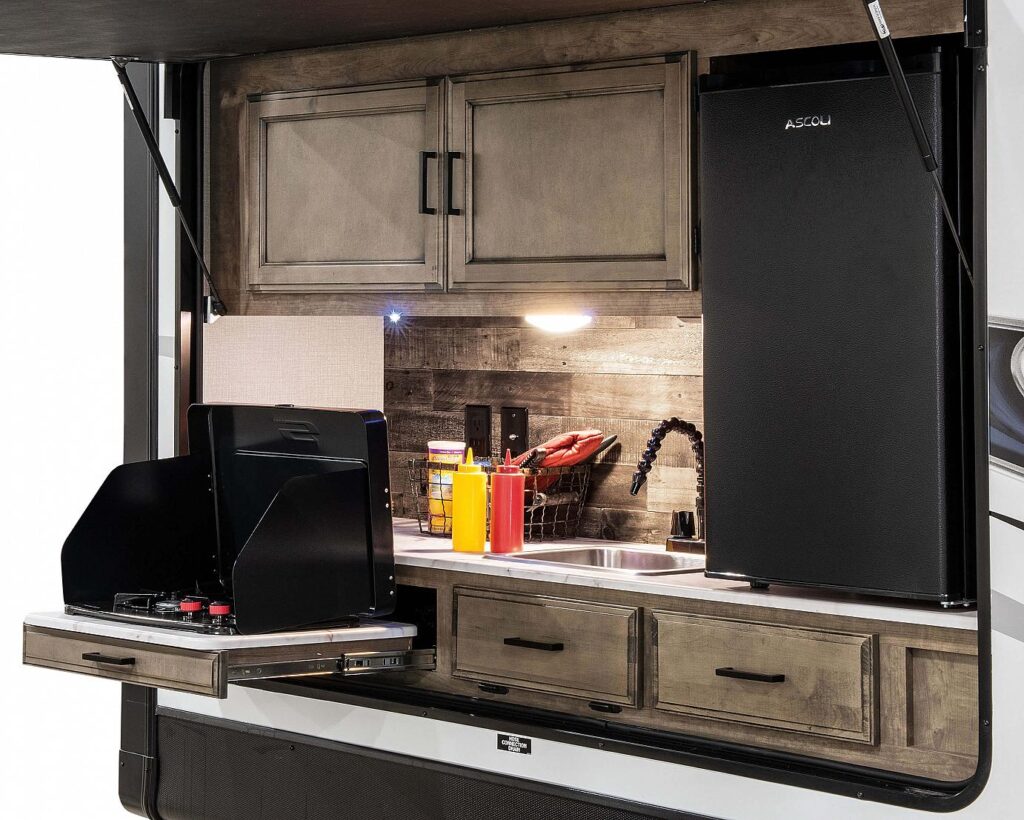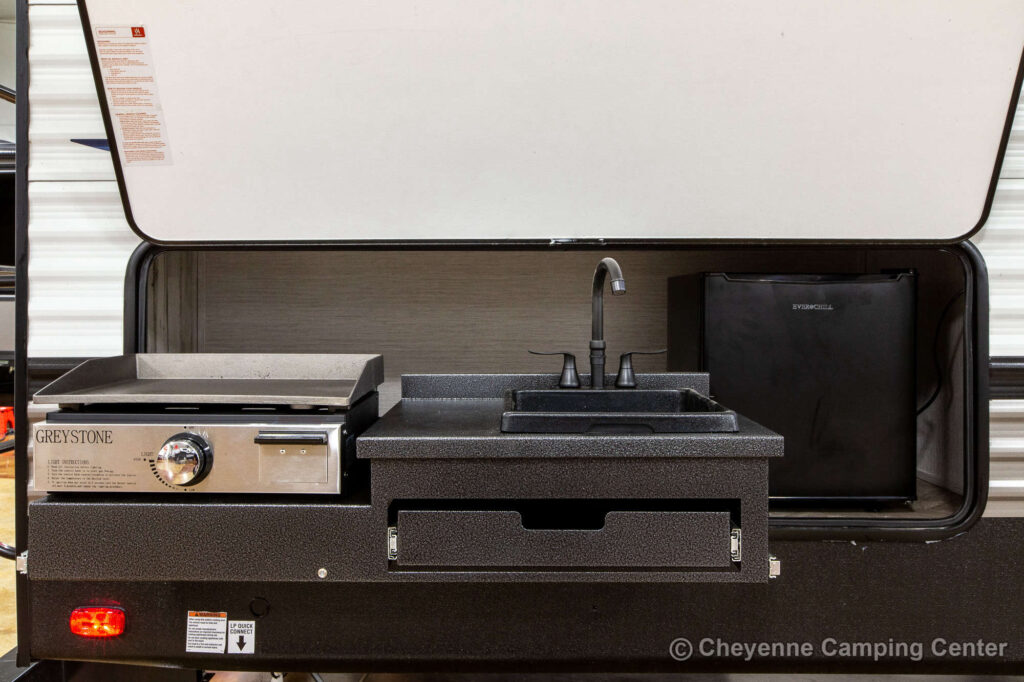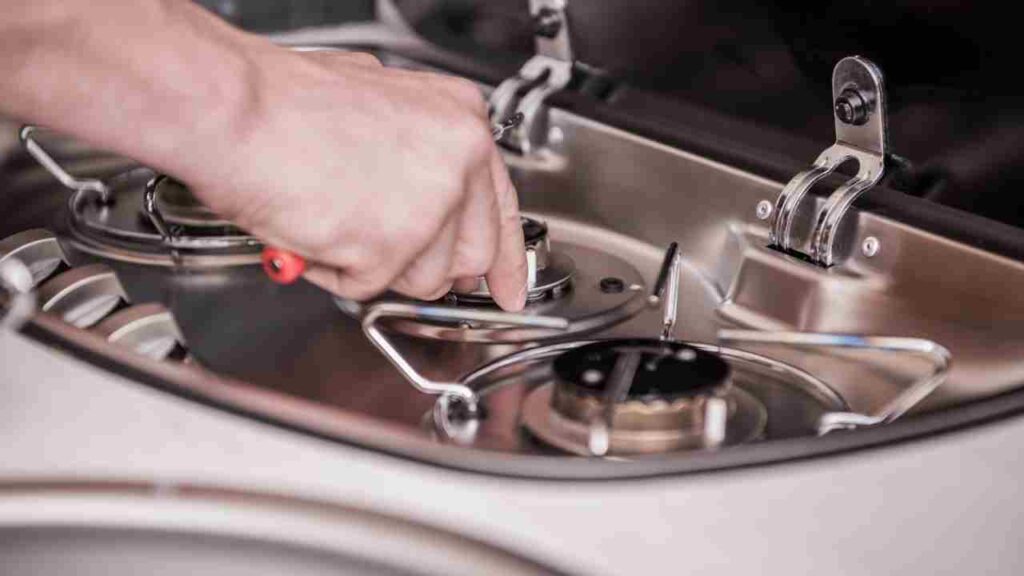
When shopping around for an RV, the kitchen is one of the biggest considerations. You’ll be on the road for weeks or months at a time, after all, and so you cannot subsist off takeout food and frozen meals alone. Does it really matter if your kitchen is indoors or outdoors? Is an outdoor RV kitchen worth your while?
Outdoor RV kitchens are convenient in that you can cook outside among nature. Cooking smells–which can easily get trapped within an RV–can also naturally dissipate. However, an outdoor kitchen isn’t convenient in all weather, it takes up space, and your RV will be heavier.
In this guide, I’ll talk about outdoor RV kitchens aka exterior kitchens so you can decide whether one of these kitchens is right for you!
An Overview of Outdoor RV Kitchen Types
Not all RV exterior kitchens are created equally. Depending on which kind is being offered, that can very much influence your purchasing decision.
Without further ado then, let’s jump into the different kinds of exterior kitchens you can select from.
Fold-Out Outdoor Kitchen
At the very, very least, the exterior kitchen you’re considering for your RV will be a fold-out kitchen.
This is the most basic type of exterior kitchen without any bells and whistles. The kitchen will have some cooking space and little else.
If you can do most of your food prep indoors and then cook outdoors, then a fold-out kitchen suffices.
For other RVers, it might not be enough, and that’s fine.
Expanded Fold-Out Outdoor Kitchen

If you find yourself needing more than what a fold-out kitchen can provide, the next type of exterior kitchen is an expanded fold-out.
Expanded fold-outs offer what you’re looking for in an outdoor RV kitchen, including running water, a sink, counter space, and amenities in that vein.
You’ll have everything you need for outdoor entertaining!
Entertainment Center Outdoor Kitchen
The third type of outdoor kitchen for RVs is part exterior kitchen, part entertainment center. The degree of amenities offered is the most extensive.
Additionally, your kitchen might include outdoor coolers and even a television!
What’s Good About Outdoor RV Kitchens?
Now that you know what your options are as far as outdoor RV kitchens are concerned, I next want to go over the pros and cons of an exterior kitchen per the intro.
It’s Nice to Cook Outdoors

Life in an RV is very different from your life at home, or at least, it’s supposed to be.
Although shedding some of the creature comforts of your day-to-day life can be a challenging adjustment in the beginning, once you get used to it, you might prefer a more unplugged, natural life.
Part of living life more natural and unplugged is cooking outdoors.
You’ll still be able to make high-quality meals in an outdoor RV kitchen just as you could in an interior kitchen, but against the backdrop of the outdoors.
You can feel the sun on your skin and the wind lifting your hair. You can enjoy the sounds of the birds and the gentle rustle of the trees as the wind blows.
These are sensations that you’re deprived of whenever you cook indoors, be that back at home or in your RV.
No Lingering Smells in Your RV
RVs–even though they’re the largest class of vehicle of their kind on the road–never feel smaller and more enclosed than when there’s a terrible smell.
Usually, that smell is a backed-up black water tank, but food smells can be nearly as offensive, especially when they’re allowed to linger.
You might do whatever you can to dispel the odor, such as open the windows, turn on any ceiling fans, and run your RV air conditioner even if it’s not particularly hot outside.
Even still, it feels like it takes forever for the smell to go. In the meantime, you and your RV mates just have to grin and bear it.
Maybe you can use an air freshener, but that just masks the smell and doesn’t remove it.
By cooking outside, those unwanted odors won’t enter your RV as you whip up your latest meal.
Whether you enjoy cooking with garlic, onions, or other strong scents, you won’t have to worry about anyone’s sense of smell, as they can breathe clear and easy.
Your Vehicle Could Be Worth More
The day may inevitably come when you decide to put your RV on the market.
If so, since it will still be in usable condition by that point, you will want to sell it for a good price.
Having an outdoor kitchen might increase the resale value of your RV. Those who love cooking outdoors will be willing to pay quite a lot of money for your vehicle!
What’s Not So Good About Outdoor RV Kitchens?
Okay, so with the advantages of RV kitchens out of the way, I want to dedicate this section to their downsides.
Take this information in consideration with the points from the last section.
Outdoor Cooking Can Attract Nearby Wildlife

While it’s great that cooking outdoors on your RV can prevent smells from permeating your vehicle, what you’re not thinking about is where those smells waft when out in nature and cooking.
That would be in your nearby vicinity. Food smells can sometimes linger for miles, which means that even if a bear or another hungry critter like a cougar, wolf, or moose wasn’t near you, they could still smell the aroma.
The animal can possibly follow the scent all the way back to your RV, which would be very dangerous for you and your fellow passengers!
You Can’t Cook Outside in Inclement Weather (Not Safely)
Before, I talked about how pleasant it is to cook outside.
I must concur that it really is an enjoyable experience that is worth doing.
However, what happens during those not-so-nice days?
If you had an indoor RV kitchen, you could retreat inside and cook there, but you don’t. Yours is an exterior kitchen only.
Even with an awning or another form of overhead protection, how comfortable would you feel cooking in the pelting rain or a heavy snow?
What about when there’s lightning or thunder in the vicinity? Then it’s not safe or smart to continue cooking.
In a scenario like that, to avoid potentially deadly electrical shocks, you’d need to retreat inside your RV.
But what about your meal? Well, no matter what state of doneness it was in, you have to let it go for now.
Hopefully, you have time to scoop it up and bring it inside before the weather gets too severe.
If you don’t, then so be it.
You’d have to wait for the weather to pass and have some snacks in the meantime.
Since you don’t want anyone in your RV getting hangry, you better wish for a short storm that passes fast!
It Can Be Hard to Find Even Terrain for Cooking
Here’s an obstacle to cooking outdoors that most people don’t think of but absolutely should.
When pulling out your exterior kitchen, you need to set it up on the ground. If you can’t find level ground when doing this, then you could run into some issues when cooking.
Boiling water could spill, oil could splash more on one side of the pan, and food come could out uneven since one side cooks more than the other.
It’s not like you can change the terrain of the ground beneath you when camping.
Plus, once you set up, you’re not going to want to drive your RV and look for leveler ground.
You’ll just hope that at the next park or campsite you go to, the ground is flatter so your meals come out better.
You Will Have Less Interior Room
The components of your exterior kitchen, although they are outdoors, are still a part of your RV.
Thus, those components will take up room in your vehicle that could have been used for something else.
For instance, maybe you could have had an extra bed or even an additional bunk bed with that space.
The vehicle could have fit more storage space, perhaps a closet or a cubby, or maybe even a toilet and a sink.
An interior kitchen will obviously require room as well, but it’s a different situation.
You expect an interior addition to your RV to take up more interior room. It’d be best if an exterior addition didn’t cut into the interior room, but it does.
Your RV Will Weigh More
RV kitchens aren’t weightless.
If yours is a more complex addition such as an extended pull-out or an entertainment center exterior kitchen, then you can expect your kitchen will weigh the max it can.
Even though you don’t have to tow an RV, that doesn’t mean the extra weight isn’t problematic.
You could face weight distribution issues if you don’t balance the other side of your vehicle, for instance.
A heavier RV is always more difficult to drive and maneuver, and your fuel economy will be worse than if your vehicle weighed less.
Exterior Staining
There’s yet one more factor that may deter you from investing in an exterior RV kitchen, and that’s the propensity for stains.
It’s one thing if you stain your interior RV kitchen. Most of the surfaces are designed for stains, and your vehicle might even have a basic backsplash for sparing your walls.
However, exterior surfaces of your vehicle beyond your outdoor kitchen are not formulated for grease stains and the like.
You could end up permanently staining your exterior window frame or even the aluminum frame of your vehicle if you’re not careful.
Grease stains aren’t that much more compatible with fiberglass or wood, so no component of your RV exterior is well-suited.
Are Outdoor RV Kitchens Worth It?

Now that I’ve gone over all the pros and cons of outdoor RV kitchens, it’s time to answer the burning question that I’m sure is at the top of your mind.
Is buying an RV with an exterior kitchen a good decision?
It can be, but you must keep the risks and downsides in mind as well.
I would recommend using a fire extinguisher when cooking outside, especially if you are working with flammable materials like grease.
You will have to check the weather and create a contingency plan for cooking on days when storms will roll through.
Do not try to ignore the weather and cook outside anyway. No meal is worth your life!
You’ll also have to be very considerate about where you park your RV so that your exterior kitchen is on as level of a surface as you can find.
Oh, and please be aware of what kinds of wild animals linger in the area. Keep your cooking outside short and sweet and try to eat inside.
Maybe spray an air freshener in the area or use a scented insect repellent to mask or obscure the smell so hungry wild animals don’t come towards your vehicle.
Conclusion
Outdoor RV kitchens sound great on paper, but when you really stop and think about the logistics, there are some very serious issues to consider.
I’m not saying that an exterior kitchen is never a good idea, but of course, it can be!
You just have to keep a lot of the points in mind that I discussed in this guide. Best of luck!
